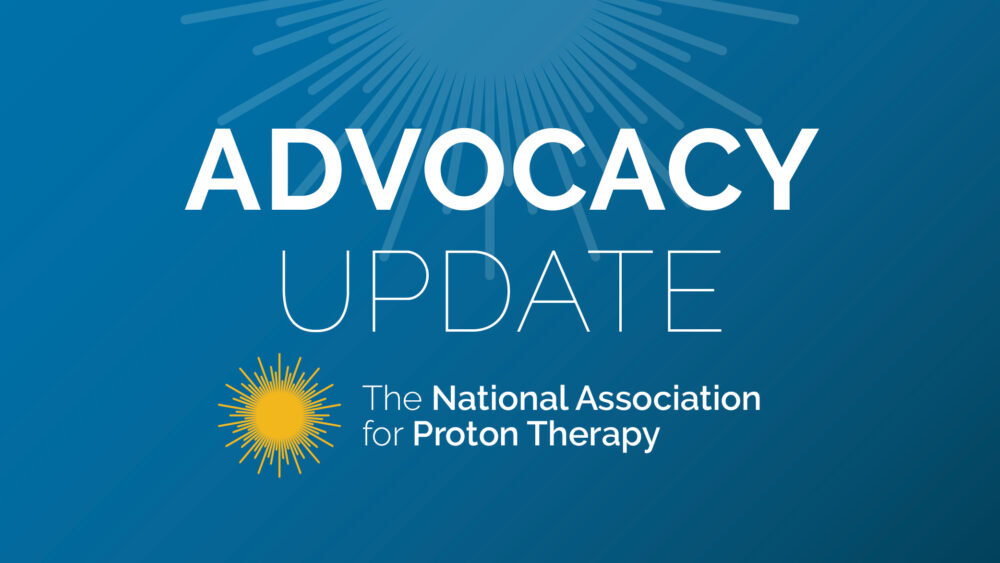On the Hill
In March, NAPT met with key Congressional offices and committee staff to advocate for policies that protect and expand access to proton therapy. Discussions focused on improving reimbursement and coverage, with an emphasis on the therapy’s benefits for complex and pediatric cases and the growing evidence base supporting its use.
FDA Commissioner Highlights Proton Therapy
At a May MAHA Commission event hosted by President Donald J. Trump at the White House, newly appointed FDA Commissioner Dr. Marty Makary praised the role of proton therapy in U.S. healthcare innovation. In his remarks, Dr. Makary stated, “The United States is best in the world when it comes to proton beam therapy, CAR-T, and sophisticated operations…” These comments highlight growing national recognition of the importance of proton therapy as a cornerstone of advanced cancer treatment. Watch the full video here.
Federal Legislation
Radiation Oncology Case Rate (ROCR) Act
The Radiation Oncology Case Rate (ROCR) Act (S.1031 / H.R.2120) was reintroduced in March to establish a mandatory radiation oncology case rate value-based payment program, where per-episode payments are made to radiation therapy providers for treating Medicare Part B beneficiaries with one of 15 specified cancer types. Learn more here.
NAPT worked closely with the American Society for Radiation Oncology (ASTRO) and Senator Thom Tillis’ office to ensure fair reimbursement for proton therapy. Through our efforts, we were able to successfully delay the inclusion of proton therapy in the model for two additional years – from 10 years to 12 years – as well as incorporate language for proton therapy and other excluded modalities that mirrors provisions for new technologies. While our proposed language to create a clear path for an alternative payment methodology for proton therapy and other innovative treatments was not accepted, we remain committed to advocating for a system that fairly values proton therapy and future innovations.
There is currently no time frame for these bills to advance in Congress. This is due largely to Congress currently being preoccupied with attempting to pass a very large reconciliation bill (more on that below) containing President Trump’s many priorities for his first term. The first sign of any movement for ROCR will most likely come in the form of the bills being the subject of a committee hearing.
Reconciliation
In May, the House passed H.R. 1, a broad reconciliation package with several healthcare provisions relevant to the proton therapy community. Key highlights include proposed reforms to the Medicare Physician Fee Schedule, changes to Medicaid financing, delayed DSH cuts, expanded site-neutral payment policies, and strengthened price transparency requirements. The bill now goes to the Senate, which is expected to make numerous changes to the bill. This will require the bill to be sent back to the House to vote again on the changed bill in order to clear it for signature into law by the President. Congress is attempting to complete its work on the bill in time to take it to the President’s desk by July 4, 2025, though that ambitious time frame may slip further into July. NAPT is monitoring these developments closely to ensure they do not negatively impact access to advanced cancer treatments like proton therapy. Read more analysis here.
State Legislation
In June, Louisiana passed Senate Bill 129, requiring health insurers to cover proton therapy for cancer treatment when recommended by the American Society for Radiation Oncology (ASTRO) practice guidelines. The law applies to all new health plans issued on or after January 1, 2026, and existing plans must comply by their renewal date or by January 1, 2027. This legislation marks a significant step toward ensuring consistent, guideline-based access to proton therapy for cancer patients across the state.
Prior Authorization
Seniors’ Timely Access to Care Act
As a member of the Regulatory Relief Coalition (RRC), NAPT continues to support the Improving Seniors’ Timely Access to Care Act (S. 1816 / H.R. 3514), which seeks to streamline and modernize the prior authorization process for Medicare Advantage plans. Download a fact sheet and find other information here.
Industry Pledge
Health and Human Services (HHS) Secretary Robert F. Kennedy, Jr. and Centers for Medicare & Medicaid Services (CMS) Administrator Dr. Mehmet Oz met with industry leaders in June to discuss their pledge to streamline and improve the prior authorization processes for plans covering nearly eight out of 10 Americans. Read a summary here.
Advocacy for Proper Proton Therapy Reimbursement
NAPT monitors and engages with Medicare Administrative Contractors (MACs) to ensure fair and sustainable reimbursement for proton therapy and coverage guidelines. As MACs play a critical role in setting regional payment rates and Local Coverage Determinations (LCD), we are engaging with key decision-makers to address concerns over rate variability and potential reductions that could threaten patient access to proton therapy. By providing data-driven insights and working alongside our members, NAPT continues to advocate for payment structures that accurately reflect the costs of delivering high-quality proton therapy.
Excellence Awards
Each year in April, NAPT honors individuals who have made outstanding contributions to advancing proton therapy through the Champion Award and Patient Advocate Award.
- Champion Award, 2025 Winner: Bill Thomas
Bill Thomas, Associate Vice President at Hampton University, led major advocacy efforts to expand access to proton therapy in Virginia. His work has helped secure key policy wins benefiting patients at Hampton and beyond.
- Patient Advocate Award, 2025 Winner: Denise Durgin
Denise Durgin, a patient at the Maryland Proton Treatment Center, has become a leading voice for proton therapy through her book Prescription for Proton Therapy, public speaking, and advocacy on Capitol Hill.
Read more on the Excellence Awards here.




